Movie Review – Black Panther
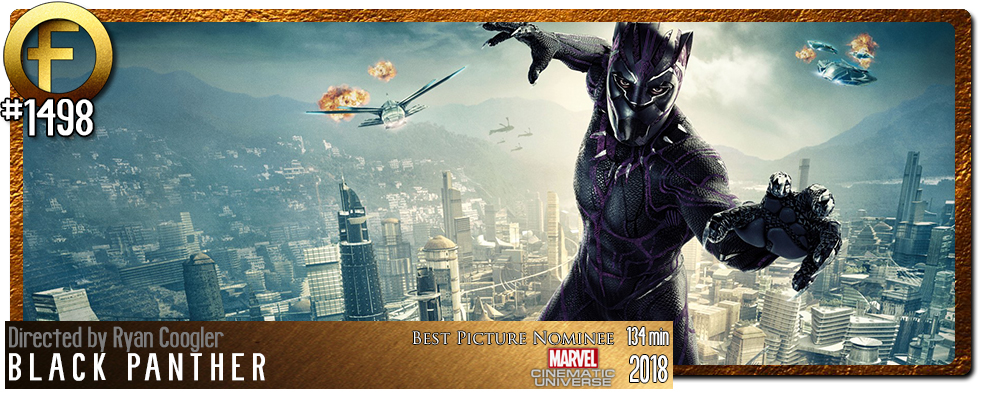
Principal Cast : Chadwick Boseman, Michael B Jordan, Lupita Nyong’o, Danai Gurira. Martin Freeman, Daniel Kaluuya, Letitia Wright, Winston Duke, Angela Bassett, Forest Whittaker, Andy Serkis, John Kani, Florence Kasumba, Sterling K Brown.
Synopsis: T’Challa, the King of Wakanda, rises to the throne in the isolated, technologically advanced African nation, but his claim is challenged by a vengeful outsider who was a childhood victim of T’Challa’s father’s mistake.
********
The penultimate MCU film before the all-out extravaganza of Avengers Infinity War, Marvel’s Black Panther is a very strong entry into an already bulging pantheon of comic book cinema. With his soft-introduction established in Captain America: Civil War, T’Challa (Chadwick Boseman) quickly became the breakout character from that ensemble instalment and fans salivated at the prospect of a solo film exploring the hinted at, barely seen isolated nation of Wakanda, source of the world’s vibranium and secretive technological utopia. Directed by Creed and Fruitvale Station helmer Ryan Coogler, Black Panther echoes 2017’s blockbuster feminist icon in Wonder Woman and becomes a touchstone character and cinematic landmark for people of colour, with its African-influenced aesthetic and thematic depth standing strong alongside other recent films such as Logan and Thor: Ragnarok.
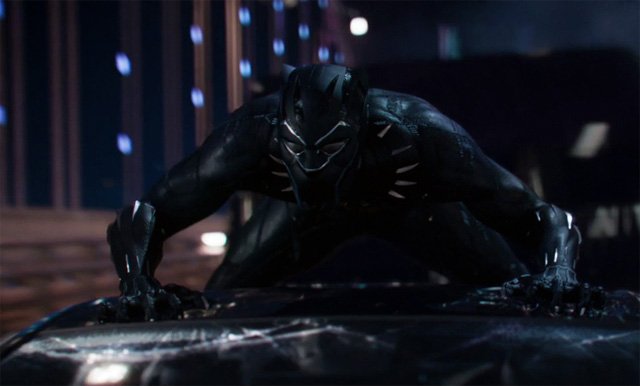
Immediately following the events of Civil War, T’Challa has become the King of Wakanda, an African nation whose true nature is hidden from the world using technology gleaned from vibranium, a mineral only found within the country and the material from which Captain America’s shield is made. T’Challa’s ex-lover Nakia (Lupita Nyong’o – 12 Years A Slave) is a covert operative outside in the world, and she has traced a stolen vibranium artefact to mercenary Ulysses Klaue (Andy Serkis – The Hobbit) and mysterious extremist Erik “Killmonger” Stevens (Michael B Jordan – Fantastic Four), the latter of whom has a tragic connection to Wakanda and seeks vengeance upon the line of Black Panther. When Killmonger usurps the throne and threatens to expose the true nature of Wakanda to the world, T’Challa, his sister Shuri (Letitia Wright – Ready Player One, The Commuter), CIA liaison Everett Ross (Martin Freeman – Sherlock) and former Queen Ramonda (Angela Bassett – What’s Love Got To Do With It, Waiting To Exhale) must gather their forces to repel the agents of evil and return their nation to freedom.
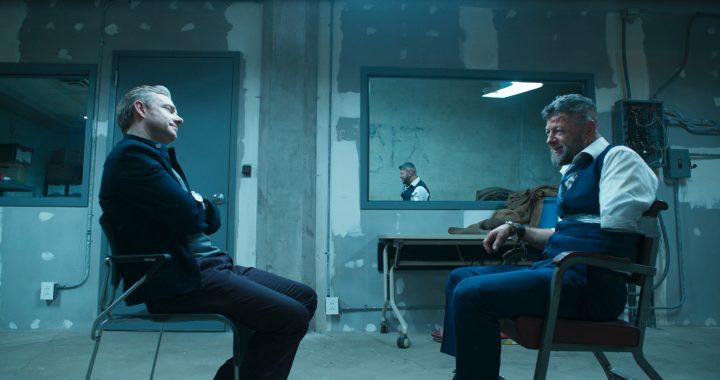
I’ll openly admit to knowing almost nothing about the Black Panther character prior to seeing his appearance in Civil War and now this film. I’m a long-term comic book reader and the concept just… never appealed to me. I never took any interest in it, even when MCU impresario Kevin Feige declared T’Challa to be one of, if not the, most important characters in the entire pantheon Marvel had the rights to. T’Challa’s role in Civil War changed my opinion substabtially; Black Panther isn’t widely known among non-comic book fans, but that has all changed now with Ryan Coogler’s vivacious, emotionally complex, thematically dense franchise instalment.
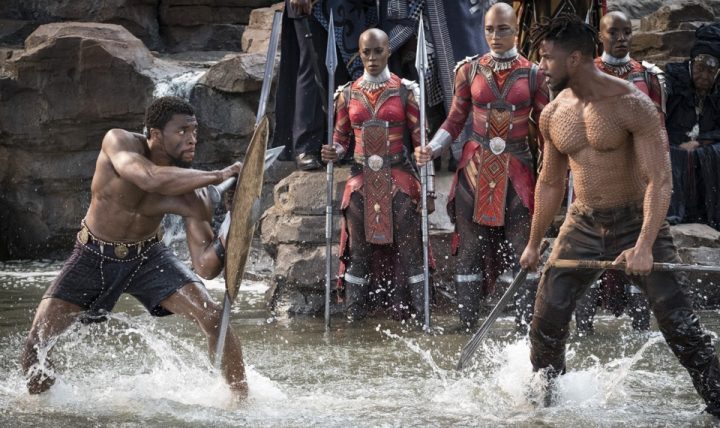
Black Panther’s story is one part origin, one part examination of concept we struggle with in modernity, and an enthusiastic comic book film unlike any we’ve seen yet out of Marvel. Coogler, who shares a writing credit with Joe Robert Cole, spends a large portion of the film examining themes of isolationism (contextually pertinent in today’s rising insular nationalism we see in Europe and the United States, among others), legacy (T’Challa has to reconcile the actions of the previous Black Panther, his deceased father T’Chaka, played by a returning John Kani from Civil War) and honour, balancing leadership with a personal arc that feels keenly prescient than even the moving work achieved in Civil War. Boseman delivers a hearty, full-throated performance as T’Challa, imbuing the character with resplendent nobility and subtle depth, bringing a character nobody outside comic book fandom had really heard of into the general public zeitgeist with an apocalyptic bang and making him perhaps the most fully realised and well conceived in the entire MCU.
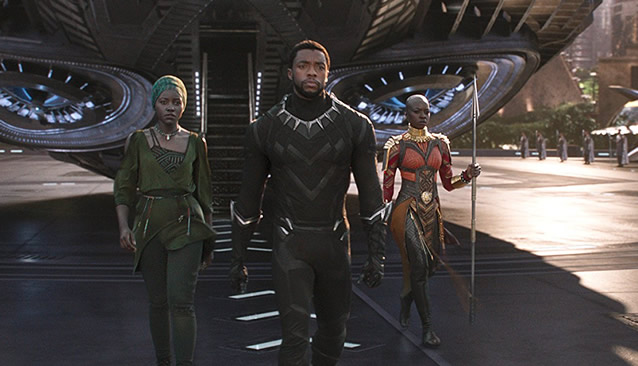
Criticism of the MCU at large usually revolves around their villains, the majority of whom are either one-note or galactically world-ending beings which both raises the stakes beyond our empathy or reduces them to deus ex machina plot twists. In Black Panther, we have Michael B Jordan’s Killmonger, a villain with a specifically deep attachment to both Wakanda overall and T’Challa in particular, and its this bond which creates one of the stronger antagonists we’ve seen to-date in a Marvel film. The character’s complexity and empathetic connections make him somebody we can understand and maybe even agree with, which is hard to accomplish in a superhero film where the majority of the time spandex suits just punch each other. Jordan’s physicality and commanding performance make him a worthy opponent to Boseman’s T’Challa, snarling and roaring his way through the film’s sudden plot twists. Backing up Killmonger is the excellent Andy Serkis, reprising his role as weapons mercenary Klaue, although in fairness the role kinda becomes more a comic book cliche the longer he appears on screen.
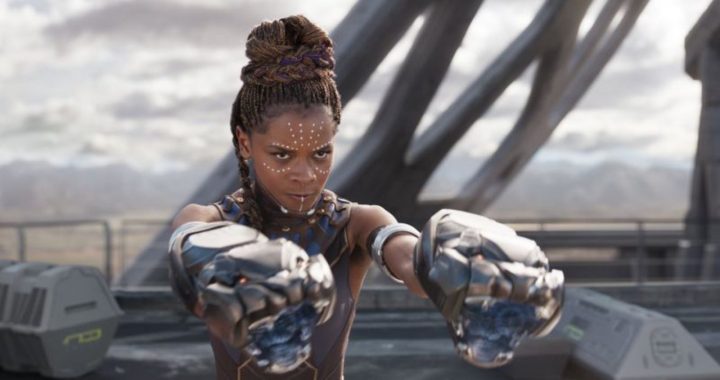
The denizens of Wakanda are, as you’d expect, played entirely by people of colour and the film is a visual, aural and narrative treat. Lupita Nyong’o makes a solid fist of T’Challa’s former flame Nakia, Get Out star Daniel Kaluuya plays the head of Wakanda’s border security force with conflicted solemnity, Forest Whitaker appears as T’Challa’s uncle and stand-in family patriarch Zuri, while roles to Winston Duke – as the hilarious M’Baku – and Danai Gurira as Wakanda’s head of the King’s praetorian guard, Okoye, widen the scope and interplay between the factionalism on display, and the film is the better for it. Letitia Wright steals the film as Q to T’Challa’s James Bond, arming him with all kinds of weaponry and technology (sources say the character is the “smartest person in the world”, even more than Tony Stark, so that’s saying something) and the sass with which she treats her older brother always grabs a laugh. The presence of Martin Freeman as… er, the token white guy in this film, is always welcome, providing a bridge between Black Panther and the larger MCU, and nobody, I mean nobody, plays befuddled quite like Freeman.
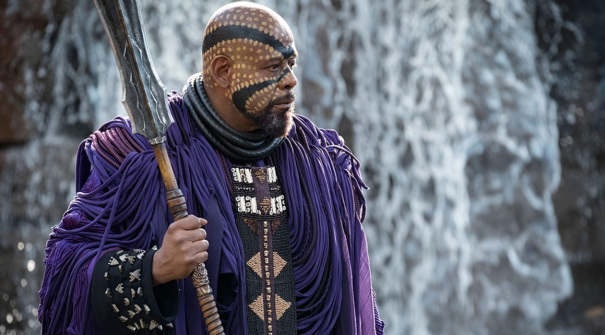
Black Panther isn’t the giggling laugh-riot that Thor: Ragnarok or the Guardians films were, although there are some really funny and sweet moments to chuckle, and the film reverts to a more serious tone almost throughout its entirety. Boseman’s gravitas holds the film together and elevates the material when it threatens to become too serious, and Coogler picks his moments to break the solemn tones with imperceptible ease. The story gives this kind of tone credence, and the humanity here is what makes Black Panther work, rather than hyperbolic effects of jaw-dropping battle sequences. Naturally, Black Panther has those too, but the climactic third-act three-pronged plot twists are grounded with established emotional connectivity, making us legitimately fear for the safety of the characters we’ve been watching. It’s a shame we know T’Challa will go on to appear in Avengers Infinity War so his stakes here are reduced a little, but the supporting characters benefit from being… well, possibly expendable.

The stakes matter here, they feel real, and the depiction of Wakanda makes me legitimately wish the place actually existed. Production design on the film – notably the Oscar-worthy costumes and world-building Coogler and his team have crafted – is amazing, to say the least; the world of Wakanda feels lived in, the characters feel true to their identities and the glorious African tones and vibrancy is an utter delight to witness in such a manner. Kudos to DP Rachel Morrison (Oscar nominated for her work on Mudbound) for her lensing of Black Panther, because she absolutely nails the aesthetic superbly. Black Panther is a different looking film to any previous film in the MCU by design, and I loved it.
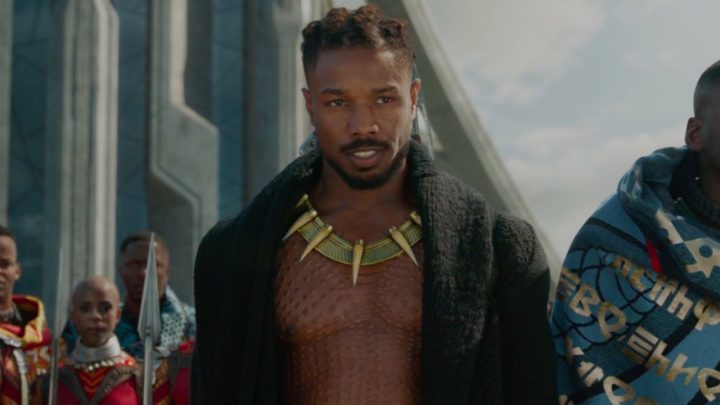
About the only real criticism I had with the film was Coogler-regular Ludwig Goransson’s score, which – African tribal themes aside – felt pretty bland. At times Black Panther’s music crept into Lion King territory (the live action remake is being directed by Iron Man director Jon Favreau, with John Cani going from here to voice Rafiki in that production) which was cool, but when the score needed a more traditionally orchestral voice I couldn’t really shake the feeling that a core theme was absent. Ask me to hum Black Panther’s theme tune, and I’ll be unable to.
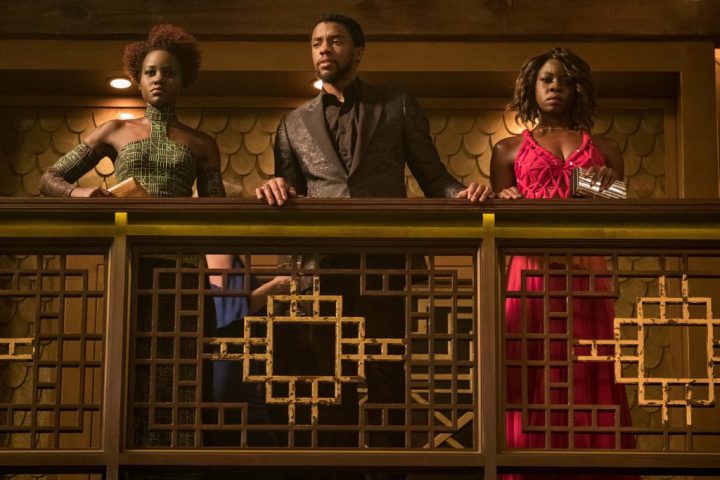
Black Panther is a worthy entrant to the Marvel Cinematic Universe. It’s well written, exceptionally well acted by its enormous (and diverse) cast, and helmed with ferocity and dynamism by Ryan Coogler, all without reducing the heft and complexity of its emotional resonance between explosions and potentially garish widescreen battle sequences. Black Panther’s strong thematic foundations and complex issues of nationalism and acceptance within a global community resonate strongly in today’s landscape of insular politics and combative red-blue tribalism. Marvel continues to impress with its development and care for the characters it deploys.


I’m with you on this one. It’s clearly the most ambitious film in the MCU and the least like the others. Thanks to the wonderful world-wide in world-building you mentioned, that’s a plus not a minus. And you’re so right about MBJ snarling his way through this one and it’s so perfect. That his motivations were, to borrow your terminology, deeply specific, yet still applicable to the world at large, gives this movie incredible depth.
I’ll be interested to see how critical opinion on this film stands once the hubbub has died down. Reflecting on the film, I’m thinking it’s not “great” but merely “good”, despite the clamour of success. Still, even a good MCU film is no small thing, as we’ve learned. Here’s hoping Infinity War slam-dunks 2018 into oblivion!
Agree mostly, but I would add that I felt almost all of the fight scenes (Korean casino and subsequent car chase excluded) featuring Black Panther himself were a let down, much like they were in Civil War. Marvel really need to either work a lot harder on that, or do what they did in Winter Soldier that made it my favourite film for fight sequences – use less damn CGI. The John Wick films have shown us you can have amazing fight scenes without needing much (if any) CGI – and the trailer for the next Mission Impossible film makes me think those filmmakers have adopted that mindset as well.
Sadly, I can’t see it happening with Infinity War if the trailers are anything to go by.
I hear you. I guess it’s having to balance “comic book possible” with “real world possible” and more often than not they’re worlds apart. I didn’t mind the action for what it was but I can see what you mean. The non-CG stuff always works better because it’s “real” and impactful, whereas stuff like Black Panther and other CG-fests tend to feel too fake by similar standards. The only thing saving this movie was my investment in the characters, which the previous two hours worked hard to achieve.